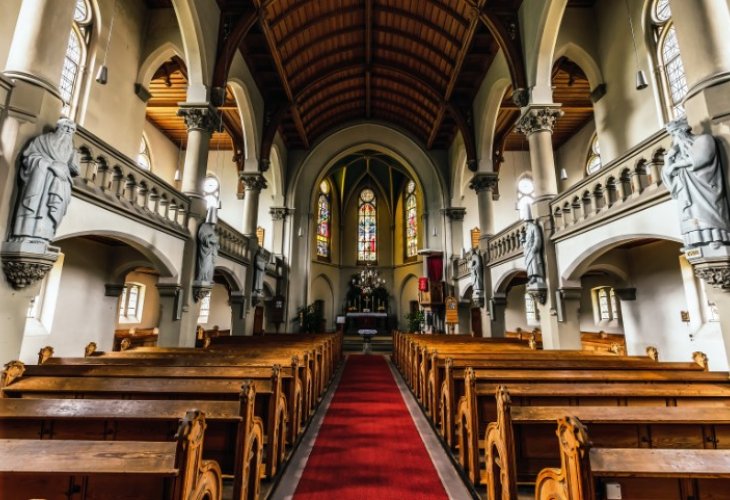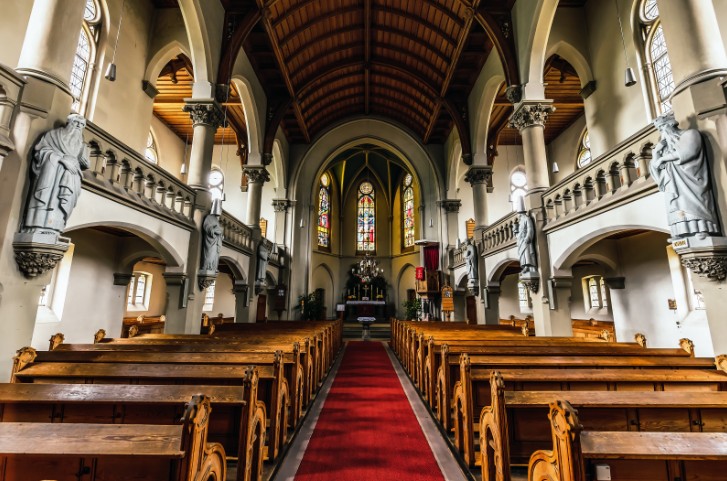Jewish Law
Why Jews Are Forbidden to Enter Churches: Halachic and Spiritual Insights on Sacred Boundaries
Rabbis explain the deep spiritual and legal reasons behind the prohibition of entering churches and monasteries — and why mosques are viewed differently in Jewish law
- Dudu Cohen
- |Updated

Many of us have encountered this situation: during a trip abroad, the group visits a church; during a military field trip near Jerusalem, a friendly monk invites everyone into a monastery; or perhaps while passing a mosque, curiosity arises about what it looks like inside.
According to Jewish law however, entering such places — especially Christian houses of worship, is far from simple. The smiling monk might seem harmless, but entering a church or monastery is viewed as deeply problematic, both practically and spiritually.
Entering Churches
“It is forbidden to enter a church,” explains Rabbi Pinchas Badush, “because for us, Christianity is defined as avodah zarah (idolatry). Christians believe in the trinity — meaning they consider Jesus to be a partner in the rule of the world. According to Torah law, such partnership is idolatry, and Jews are forbidden to benefit in any way from a place associated with idolatry. This is stated by the Rambam (Maimonides), by all the early halachic authorities, and it is one of the Thirteen Principles of Faith.”
Photographs Near Churches
Can one take a photo outside a church, as part of the scenery?
“No. Even that is considered deriving benefit from idolatry,” Rabbi Badush says.
Entering Mosques
Here, however, the ruling is different. “It is permitted to enter a mosque,” says Rabbi Badush, “because a mosque is not considered a house of idolatry. Muslims believe in one God; they merely believe that Muhammad was His prophet, but they do not consider their prophet to be a partner in creation or divine governance.”
Is it permitted to enter a mosque on a tour or for educational purposes? “Yes, if it is done for the sake of darchei shalom — promoting peaceful relations."
Rabbi Eli Amar clarifies the difference further: “There is a fundamental difference between a church and a mosque. Christians believe in the trinity, which constitutes idolatry, especially since churches contain images and statues. Therefore, a church is a place that one must not enter at all.”
Is it problematic to enter without praying? Isn’t idolatry only about bowing or worshiping an idol? “King Solomon said, ‘Keep far from her door’ (Mishlei 5:8). The Sages teach that this verse refers not only to a house of immorality but also to a house of idolatry. Some people could be influenced by such places, so we don’t even come near them.”

Spiritual Consequences
Rabbi Amar adds that entering such places has unseen spiritual consequences: “It’s like the prohibition for a priest (kohen) to enter a cemetery or for Jews today to enter the Temple Mount. The word tumah (impurity) comes from atum — blocked; taharah (purity) from tzohar — light, openness. Some actions block a person spiritually, while others open him.
The mikveh purifies and elevates spiritually. By contrast, entering a place of impurity — like a church, blocks the soul’s spiritual channels. The impurity there is so strong that it can sever a person’s spiritual flow altogether.”
“For example, Jews today may not enter the Temple Mount because our spiritual state is low — we are all tamei met (impure from contact with the dead), and the Mount is exceedingly holy. The clash between impurity and holiness is like a spiritual short circuit. Not every sin creates such an effect, but places like churches and houses of idolatry certainly do.”
What About Mosques on the Temple Mount?
Rabbi Amar concludes: “Mosques themselves are not impure, since Muslims are not idolaters. However, entering the mosques on the Temple Mount is forbidden — not because of the mosques, but because of the sanctity of the Temple Mount itself.”

